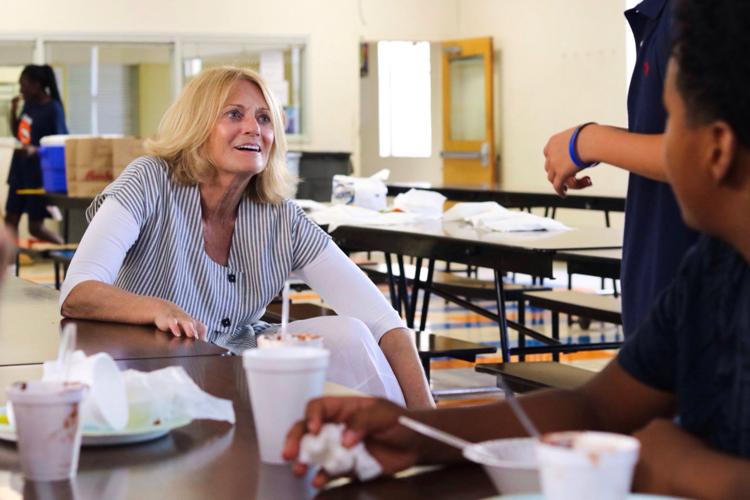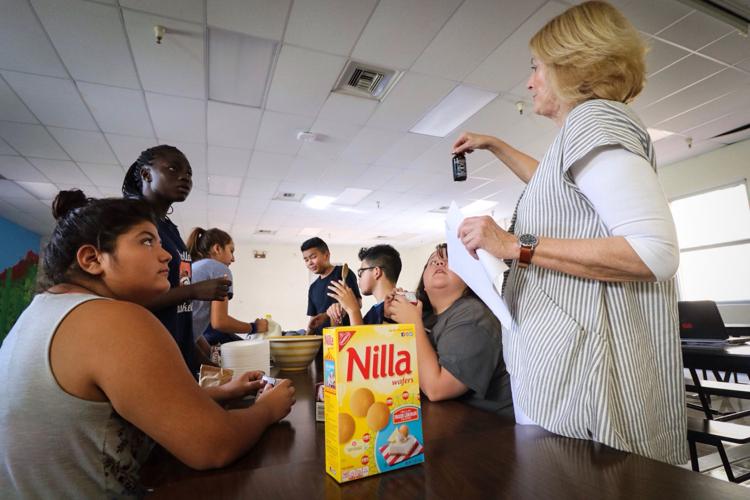Editor’s note: This is the first in a series spotlighting local mentoring programs in partnership with Mayor Jonathan Rothschild’s initiative to recruit more Tucson mentors.
For professionals who want to give back but have limited time, the Leadership Institute may be the answer.
For about 15 to 20 hours over the course of a school year, mentors talk life skills with seventh- and eighth-graders at Safford K-8 School, 200 E. 13th St. The mostly after-school program focuses on preparing students for high school, college and life beyond.
For eighth-grader DeBrandi Valenzuela, the Leadership Institute last year gave the her the confidence to speak up in classes and even in a school assembly.
Rosie Valdez, now a freshman at Cholla High School, realized she did have the qualities of a leader. She just needed someone to point them out to her.
“Someone who is not their teacher, who is not their parent, who is not their family is helping engage them in: ‘Look, this is what life could be for you,’” said Diane Dean, the teacher of the student leadership and service class and the Leadership Institute’s sponsor teacher. The institute is an extension of her leadership/student council class for certain students. Students can choose to participate in both seventh and eighth grades.
This is the third year for this variation of the Leadership Institute. The program began as a one-day workshop pairing about 20 mentors with Safford girls, in partnership with the Girl Scouts of Southern Arizona. That lasted for about 2ƒ years, said Gretchen Shine, the program developer.
Although mentors don’t participate in every activity, theirs is a key role in helping students make connections between leadership skills and the real world.
“It’s a completely objective person saying, ‘You are awesome, and what you just did was incredible, and can you see how it relates to a job in such-and-such?’” Shine said. “Kids are so hungry for feedback. You would think they don’t want it, but they grow and benefit from these mentors’ feedback.”
As a young professional, Shine received advice that followed her through her career with AT&T and Cox Communications.
“I was a big reader but not a big talker and got feedback that I should stop reading and start leading,” she said. “It was such a changing moment for me, and it really changed the course of what I feel was my professional life.”
In retirement, she wanted to expose students to their own potential.
“These kids may just have one parent in the home, so particularly for the boys, they really bond, as do the girls, with their mentors,” she said.
Each year, the Leadership Institute pairs about 20 students with adults working in fields of potential interest. At the very least, Shine tries to match personalities or interests. Often those dreams change as the school year progresses.
“Her career interests spanned engineering all the way to baking,” said De- Brandi’s mentor, Cynthia Garcia, senior director of transmission and distribution operations for Tucson Electric Power. “We prepared her résumé with a little bit of both in mind, because I helped her make the connection between the creative energy of baking and the creative energy of problem-solving in engineering.”
Mentors work with students to develop résumés, practice job interviews, think through time management and estimate a college budget, among other activities. Students also get exposure to entrepreneurial endeavors, theater and the arts. Many of the activities, which Shine prepares for mentors and mentees ahead of time, require students to participate and simulate real-world experiences.
“I feel like it was really good for me to get to do this because college is already in mind for me, and I’m already ahead with being organized and taking notes, and I’m already good at executing presentations, and those are things you will need in high school,” said Rosie Valdez, who went through the Leadership Institute in seventh and eighth grade.
Her brother, Ben Valdez, is entering his second year in the program, this time as an eighth-grader, with mentor Bill Mishler, a professor of political science at the University of Arizona.
“When I first met him, he was a bit shy,” Mishler said. “When he met someone, he was looking at his shoes as he shook hands. … By the end of the year ... he had the wherewithal to know you look someone in the eye and you confidently shake their hand, and I think he was more confident overall and more willing to say, ‘This is the right thing to do. Let’s do it this way.’”
For Ben, having a mentor meant having a brainstorming buddy rather than just calling on the teacher for help.
“It’s an older friend,” he said. “I don’t really think of them as someone who is in charge of you, telling you what to do.”
Dean, the Safford teacher, loves seeing those relationships blossom throughout the year.
“For me to stand back as an educator and watch them interact with someone else who is giving them the same skills that I would love for them to have, but they’re just getting it in a different format, it was totally engaging and they were just all in,” she said.
Rosie and Ben’s mom, Cruz Valdez, has seen her children grow in confidence as a result of the program.
“They get to see that they are leaders,” she said. “They are role models, and just the same way that they are learning from their mentors and peers, the younger kids at the elementary school are also looking up to them.”
Debra Valenzuela, De- Brandi’s mother, said her daughter is already thinking about finding jobs and preparing for college.
“This is the kind of program that just betters our kids, because around here, a lot of them just don’t have those opportunities,” she said. “For me, if it wasn’t for this institute, I wouldn’t be able to go pay a program for them to get this information.”
When possible, Shine tries to pair mentors and students for both seventh and eighth grade. She wants to find male mentors, particularly Hispanic and African-American men, along with attorneys and doctors.
She makes it easy for mentors by preparing real-world lessons ahead of time and then explaining them to mentor-mentee teams during each session.
“It’s all spelled out,” she said. Mentors “have a guided lesson to go through and help the kids. They don’t have to worry about awkwardness or spending any money.”
Laura Baker, the assistant chief for the Tucson Fire Department, has participated for several years.
“It is so doable,” she said. “I have so much going on, but the time commitment is nothing strenuous.” Still, “It is a commitment and it’s being there and being accountable and supporting the program, because those students rely on you.”
Mentees aren’t the only ones who benefit.
“I get as much out of this as DeBrandi does,” Garcia said. “It’s inspiring not only to have the one-on-one relationship ... but to hear from the kids their perspectives and milestones and hopes and aspirations. It’s very inspiring for me as to where we’re headed.”





